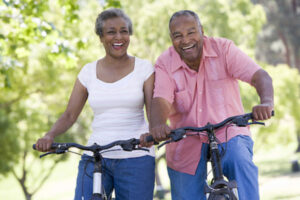The Physiological Benefits of Exercise: Stay Younger, Longer

The old-time adage, “age is just a number”, may be more than a hopeful promise and actually backed by scientific evidence. According to new research findings, how we age is a matter of the decisions we make along the way, one of which is the extent to which we incorporate exercise into our regular routine. The benefits of exercise not only keeps you healthy now, but keeps the body and mind younger for longer.
As we age, our bodies inevitably change. Our joints get creaky, our skin saggy and our bodily processes less efficient. However, these developments may not just be owing to the passage of time; rather, they may simply be a reflection of lifestyle.
Recently, a study published in The Journal of Physiology investigated the relationship between age and the physiological function of highly active older adults. For the study, researches gathered 85 men and 41 women between the ages of 55 and 79 who bicycle regularly. After a bunch of physical and cognitive tests and removing confounding variables, researchers compared the results of the cyclists with benchmarks of so-called “normal” aging.
The results were clear: the cyclists didn’t show their age – their physical levels were similar to those of much younger adults, including their levels of balance, reflexes, metabolic health and memory. While levels of endurance and strength did indeed lower as the cyclists aged, indicating the passage of time’s effect on even athletic bodies, the message remained: aging is different among those who are active.
While aging may be easy and orderly to define with numbers, doing so does not do the active body justice. The benefits of exercise not only keep you fit and healthy in the now but also help you to age more gracefully and with a still-functioning physical capacity.
Related on Organic Authority
DIY Homemade Anti-Aging Cream Recipe
Facial Yoga is Your Non-Surgical Pass to Anti-Aging Bliss
How to Prevent Wrinkles by Nixing 8 Everyday Habits that Age Your Skin
Photo Credit: neurotrials

